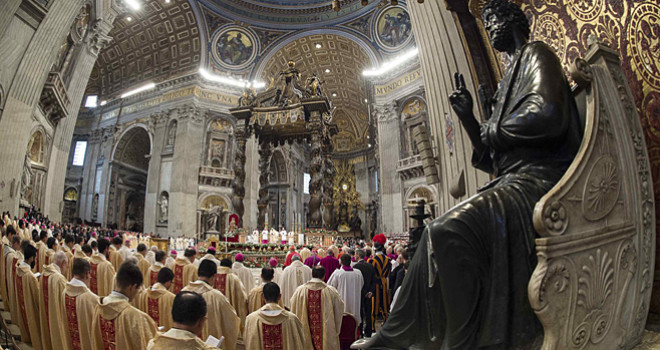Media Mum as Christians Die: Genocide in Nigeria
March 21, 2019Msgr. Charles Pope: Learning the Lessons of Lazarus and the Rich Man
March 21, 2019
By Rev. James V. Schall, S.J., Crisis Magazine, March 21, 2019
“This is why respect for truth is ultimately inseparable from what we call worship. Truth and cult are inextricably united—one cannot exist without the other, however often history may have separated them.” ∼ Joseph Ratzinger (1982)
 Liturgical thought today seems to downplay the importance of doctrine while elevating the significance of practice. The harmony of lex orandi as the criterion of lex credendi is questioned. Dogma and liturgy seem to have parted company. We have to choose which side we are on: doctrine and its pastoral application together or merely the latter severed from doctrinal truth. Many a difficult moral case, to be sure, cannot easily be solved. Yet, doctrine seems “rigid”—to use Pope Francis’s oft-repeated accusation. For some, no clear answer seems forthcoming—even after much contemplation. We must act in obscurity. The world is like a “field hospital” where urgent cases must first be dealt with the best way we can. The rules don’t apply to everyone.
Liturgical thought today seems to downplay the importance of doctrine while elevating the significance of practice. The harmony of lex orandi as the criterion of lex credendi is questioned. Dogma and liturgy seem to have parted company. We have to choose which side we are on: doctrine and its pastoral application together or merely the latter severed from doctrinal truth. Many a difficult moral case, to be sure, cannot easily be solved. Yet, doctrine seems “rigid”—to use Pope Francis’s oft-repeated accusation. For some, no clear answer seems forthcoming—even after much contemplation. We must act in obscurity. The world is like a “field hospital” where urgent cases must first be dealt with the best way we can. The rules don’t apply to everyone.
Resolute authors resort to probabilism or even “probabiliorism”—to what is safe or more than safe. The first emphasizes freedom, the latter safety. If these solutions do not work, we turn to consequentialism. This means a moral action is right if its consequences are what we want. Another option is historicism: each age has its own solution that can contradict the answers of an earlier age. A “pastoral” solution to complex problems that does not appeal to truth is close to what used to be called casuistry or even sophistry. The abstract moral principle is applied to a particular case. Particular cases usually have many contingencies about them that mitigate or increase responsibility for the gravity of the act. In any case, we have to make a decision. The good of the believer requires it. If the law is not clear, we are free to take the side of liberty—in dubiis, libertas. Under such circumstances, quite a few will accept the Machiavellian solution—we make evil our good….Read entire article, go to:  crisismagazine.com/2019/proper-liturgy-needs-doctrinal-truth
crisismagazine.com/2019/proper-liturgy-needs-doctrinal-truth




